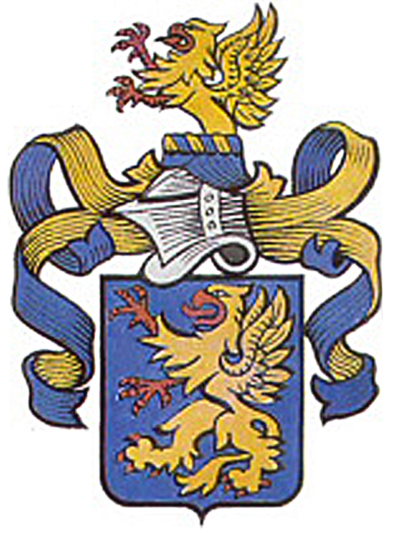Message from Coenraad
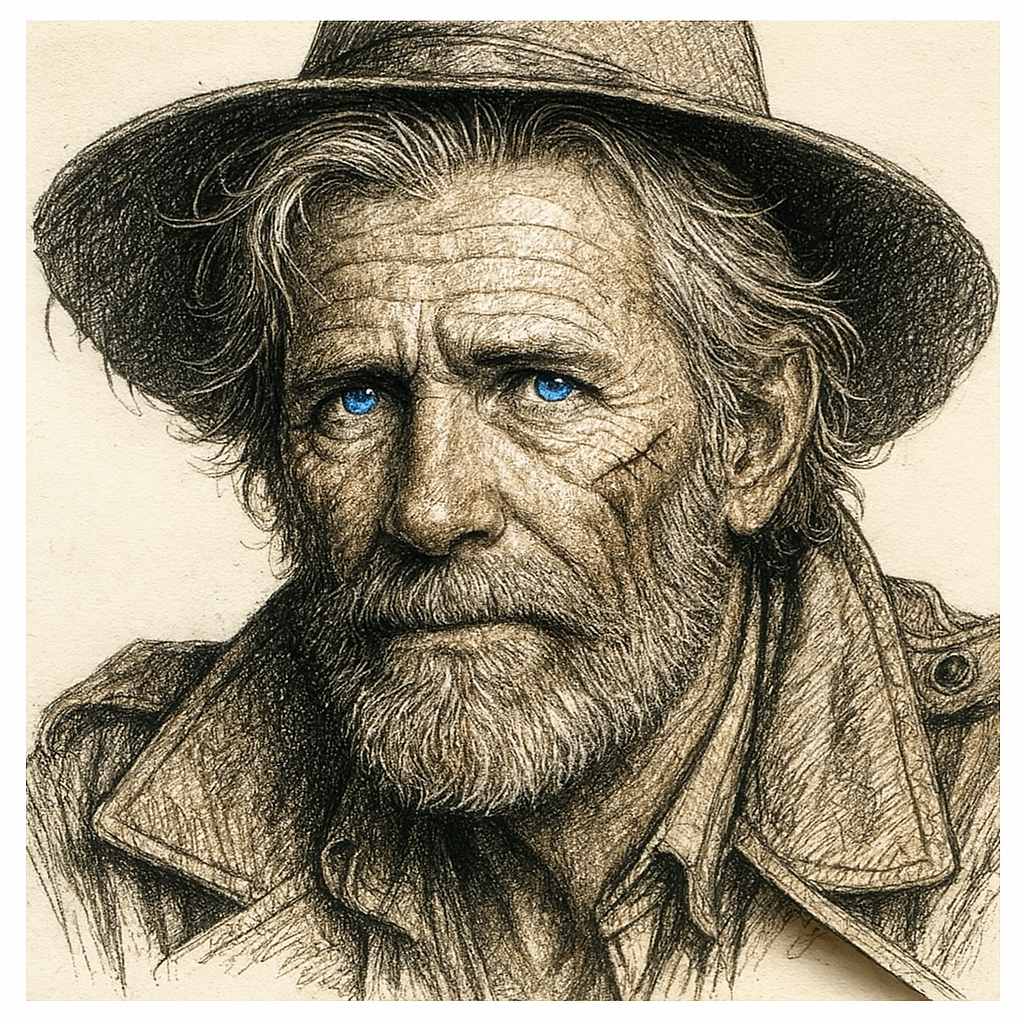
"Ek is nog hier, swaer!"
I sit under camelthorn trees older than memory. I’ve traveled worlds most people only dream about. The stories you’ve heard about me — they’re just fragments. Half-truths echoing in the wind.
You see – I never really left.
This country—its mountains, its bones, its very breath—still speaks to me. And I've been listening. Not for gold or glory, but for something far more precious: truth. And freedom. Two sides of the same coin.
I lived with the Bushmen and learned to sit still by the fire. I rode behind mules with a royal Hottentot. I married a Xhosa queen. I went to heaven and taught the Zulus. I crossed borders no map had drawn. They called me wild. A cattle thief. A troublemaker.
But I was just free!
I carry more stories than any book could hold. Some are old—from the Huguenot blood that runs in my veins. Others come from the veld—told by those who spoke in clicks and danced beneath the stars. And some are new—insights I've gathered from watching the world turn, still alive in the hearts of my children scattered across continents.
Yes... I'm still watching.
This space isn't a book or a museum. It's a lapa with a big, inviting fire—a living arena for those who still ask questions and have time to listen to the whole answer.
I may never get to tell it all. I've always been a man of few words. But if you listen with your heart and let your imagination run free, you can ride beside me to wild places, far and wide.
And if you have a story to tell, I'll throw another log on the fire, pour the witblits, and we'll kuier until the morning star winks at us.
When the wind shifts just right, perhaps others will hear us laugh. And when you're alone, working late into the night, you might feel my hand on your shoulder—and know:
I'm proud of you. Just like you should be. Because you were born of good stock.

My name is Coenraad de Buys
Outlaw. Wanderer. Witness to Life.
Welcome to my world.
Hoe Begin mens 'n Storie?
Hierdie dag was ‘n absolute omwenteling in my lewe. Ek was skaars 10 jaar oud en het die drastiese stap geneem, om weg te loop, die berge in – weg van mense af. Dit het gevoel soos 'n goeie plek om my storie te begin.
Daardie dag is ek oor die Witzenberge en my bewerige sprinkaanbeentjies het my gedra tot waar die plaas “Slangboom” vandag is. Soos die kraai vlieg, net 10 km, maar oor ‘n redelike hoë, moeilike berg!
Daardie aand, onder die wildevye, aan die voet van die volgende berg, het ek, die ergste nagmerrie van my lewe gehad.
Ek is eintlik ‘n man van min woorde, daarom is ek baie bly dat !Kaggen my gaan help om die storie van my lewe te vertel.
Ons het gedink om die eerste deel van die storie Sprinkaan te noem (my bynaam omdat my ledemate so lank en dun was). Dit grief my 'n bietjie dat die storie in Engels is maar miskien kan meer mense dit dan lees. Hierdie paragraaf spel basies uit wat my keuses was:
While we watched the dark slowly fade into dawn, I was thinking to myself, he really only had two choices with the cards that he was dealt with: He could allow the world to emasculate him or rebel against the events and blaze his own trail.
Sprinkaan

Die plan is om nuwe stukkies wat geskryf is hier op die website te "post", wat almal wat ingeteken het, in kennis sal stel. Kommentaar en advies is baie welkom en wanneer almal dit gelees het, skuif ek dit oor na die "Sprinkaan" bladsy toe om die hoofstuk te bou.
Indien dit jou eerste keer op die blad is kan jy die begin van die storie daar gaan lees, om op te vang. Hier gaan ek 'n kort opsomming van elke deel skryf, insluitende van die meer tegniese inligting wat die storie te stadig sal maak.
Dag 1
Die jaar was 1771 en die Kaap was nog Hollands.
Ek was nie gelukkig op David se plaas nie en 'n brokkie inligting uit my verlede was genoeg om my die pad te laat vat, die berge in.
Van die plaas af tot op die kruin van die berg is 4 kilometer, wat nie ver klink nie maar hou in gedagte, dat in die 4 kilometer het ek 900 meter geklim. Die 2 kilometer van die voet van die berg af tot op die kruin, het 700 meter gestyg.
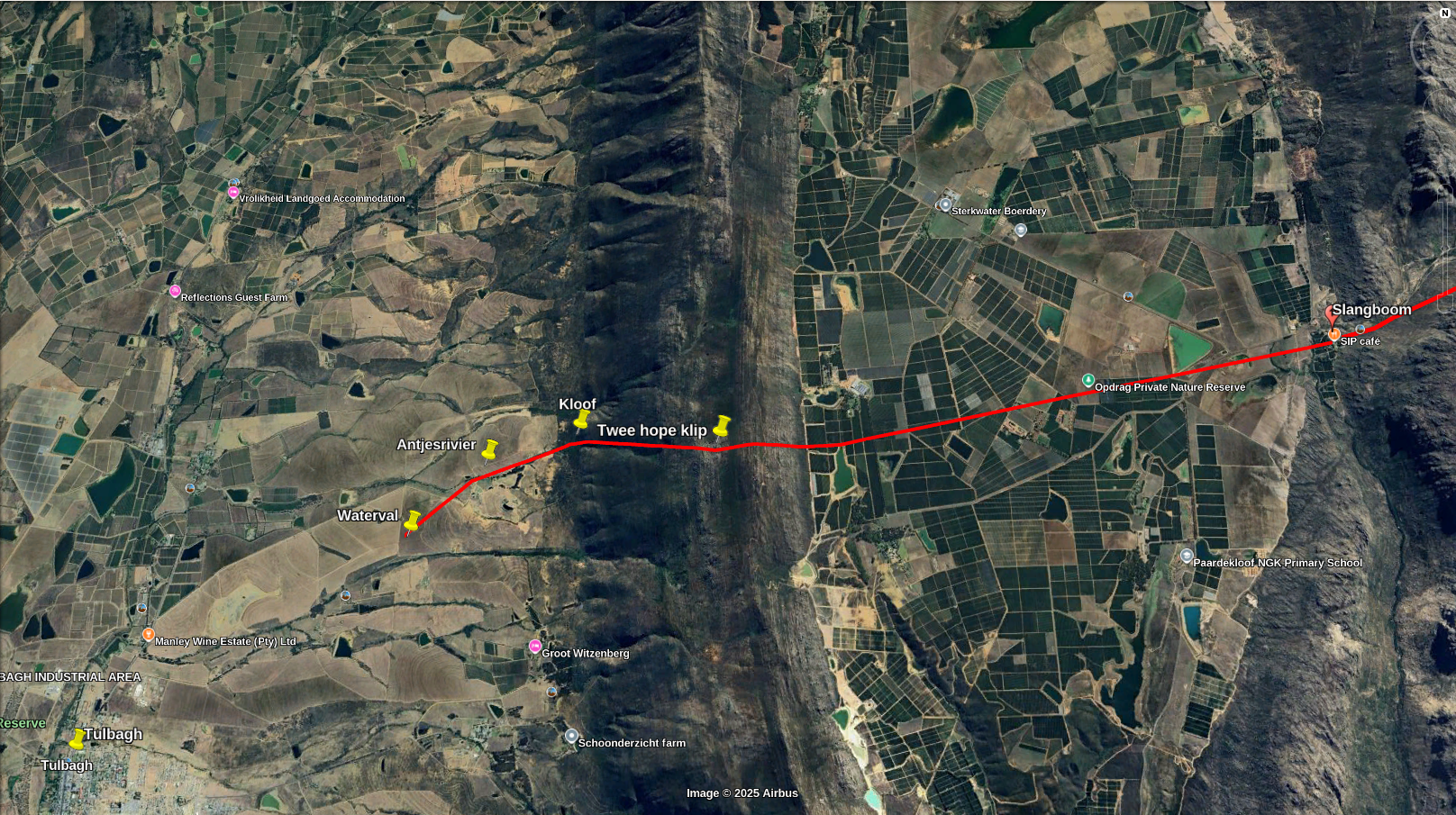
In totaal het ek omtrent 10 kilometer op die eerste dag gestap. Kliek op die foto hier bo, om dit beter te sien.
Die terrein het baie anders gelyk 250 jaar gelede. Vandag is dit net vrugte plase, terwyl in my tyd was dit gras en wabome of soos dit vandag proteas genoem word. Die wereld was nog wild en dit was nie so snaaks om die twee geelslange te gekry wat baklei het nie.
Iets eienaardig van my, wat mense nie verstaan nie, is dat ek 'n denkbeeldige vriend gehad het met die naam Klip. Ek het regtig geglo dat hy in die rotse gelewe het en ek het met hom gepraat.
Nog meer besonder is dat ek op my oudag bevriend geraak het met 'n hottentotsgod, of wat die Boesmans !Kaggen noem en dat hy my help om die storie te vertel.
Die nagmerrie by Slangboom het my diep geruk en dit het my jare geneem om dit te verwerk en te verstaan.
Dag 2
Die tweede dag se stap was baie makliker. Van Slangboom af tot by die voet van Duiwelsberg was wel 14 kilometer maar dit was meestal op gelyk grond. Die stukkie van Slangboom af teen die klofie op het omtrent 200 meter gestyg en aan die ander kant het ek minder as 'n 100 meter gesak. Kliek op die prentjie om dit groter te maak.
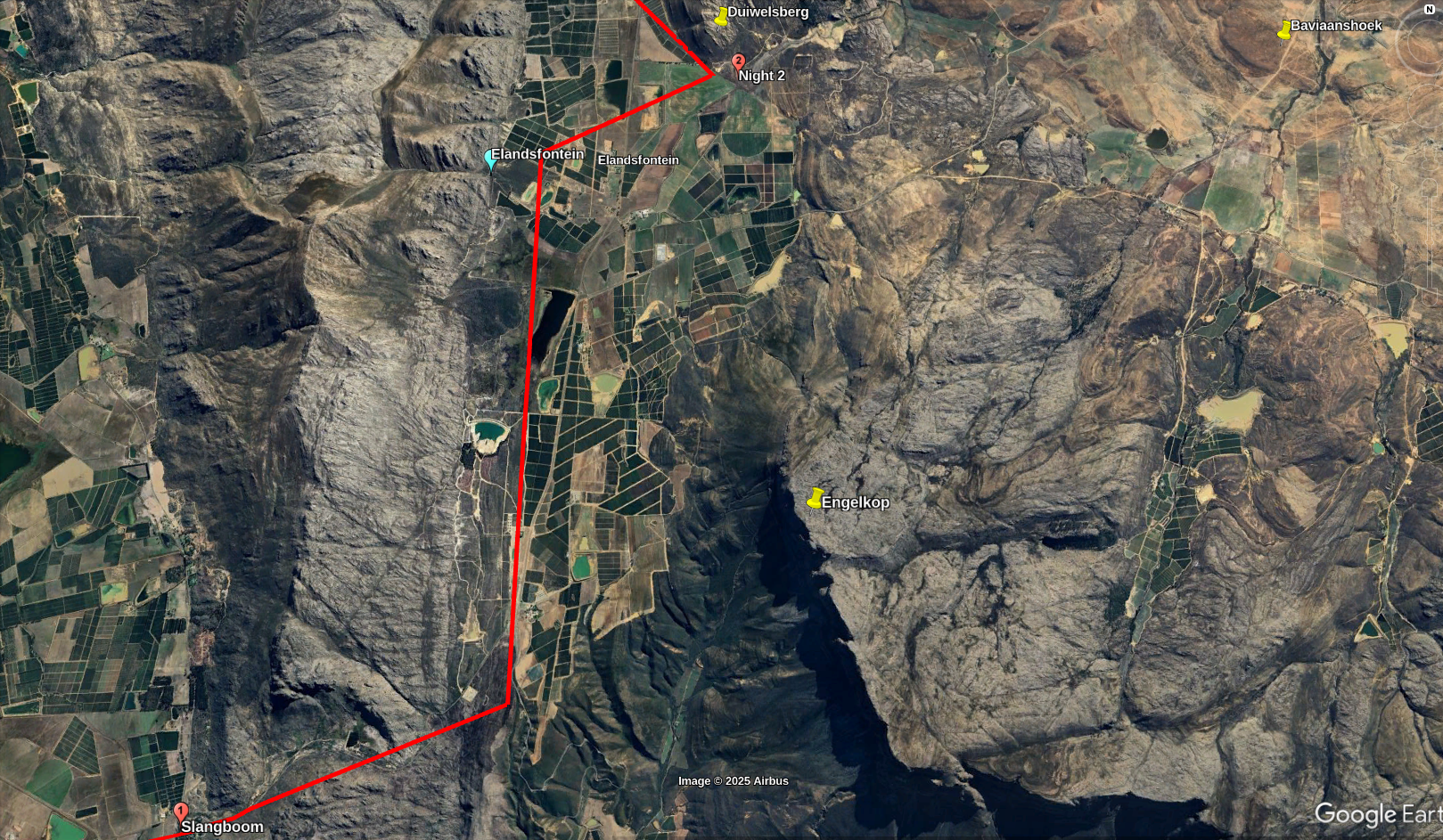
Op die bopunt van die nek is die uitsig baie mooi. Engelkop is reg voor jou en aan die regterkant is die Gydo pas, wat afkronkel na Ceres toe. Na links is die valley wat jou Koue Bokkeveld toe vat.
Terwyl die stap so maklik was en ek eintlik teen ou Jakob se advies gegaan het, het ek baie aan hom gedink. Daar was heelwat wild wat ek gesien het onder andere 'n troppie elande. Dit het my laat dink aan die elandbul wat Jakob se been gebreek het. Hy wou nooit veel daaroor se nie maar dit het sy lewe drasties verander. Ek het ook gewonder hoekom daardie mooi fontein, Elandsfontein genoem is.
Die weer was nie baie lekker nie en ek het om Duiwelsberg geloop om uit die ergste wind te kom. Die aand hoor ek vreemde stemme en miskien het ander mense dit ook gehoor en dit is dalk hoe die berg sy naam gekry het. Gelukkig het dit nie gereen nie en kon ek darem 'n vuurtjie maak vir geselskap.
Dag 3
Die deel is nog op pad maar ek kan noem dat dit van Duiwelsberg tot by Tierberg gaan wees. Dit is ook hier wat 'n eenoog luiperd my storie amper baie vroeg kort geknip het. Maar meer daaroor later.
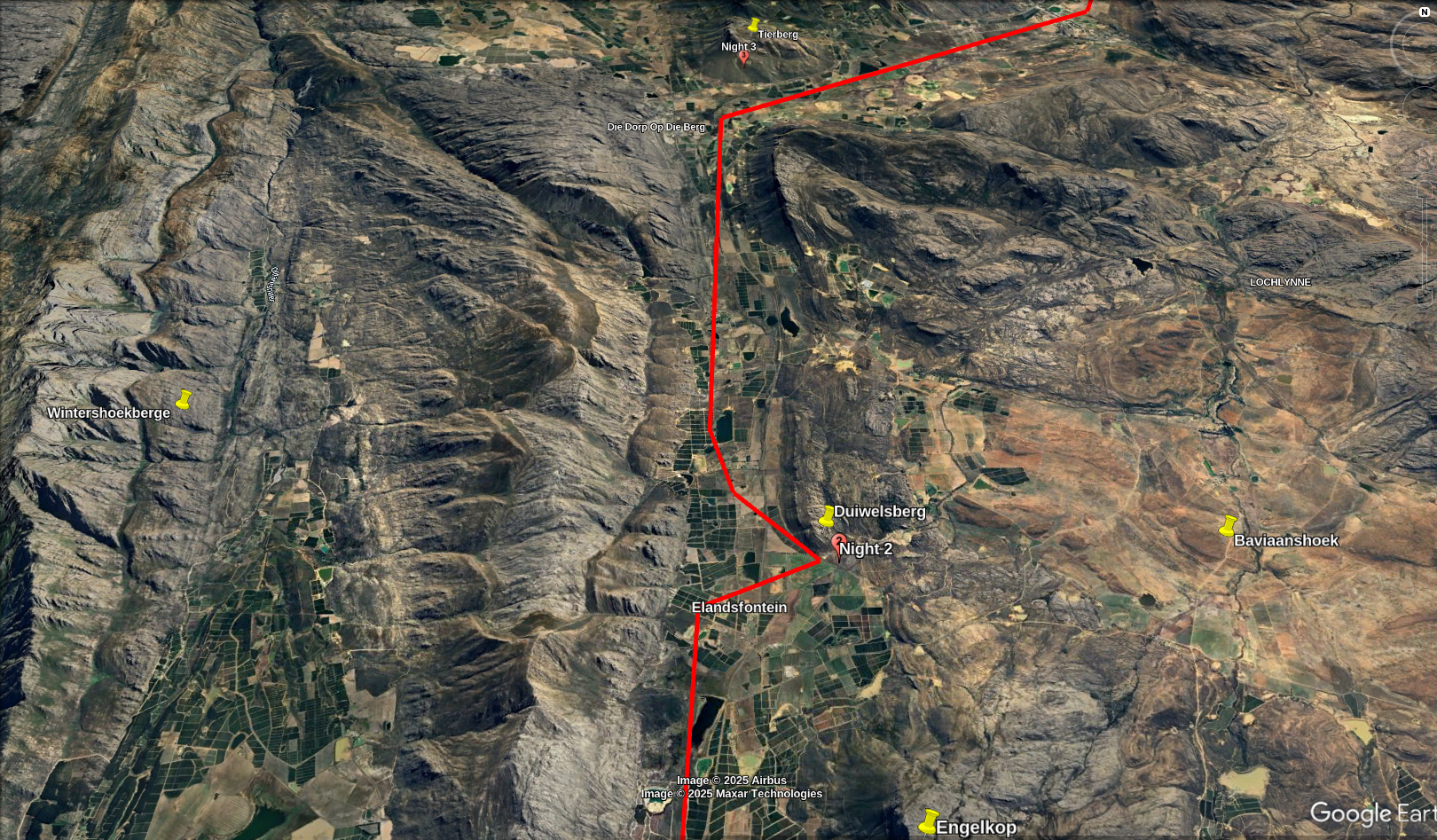
Ek het bietjie laat begin stap die dag maar het nogtans die 18 kilometer redelik maklik geloop omdat dit alles plat was. Ek moet se dat ek my vergaap het aan die pragtige landskap en die rotsformasies.
